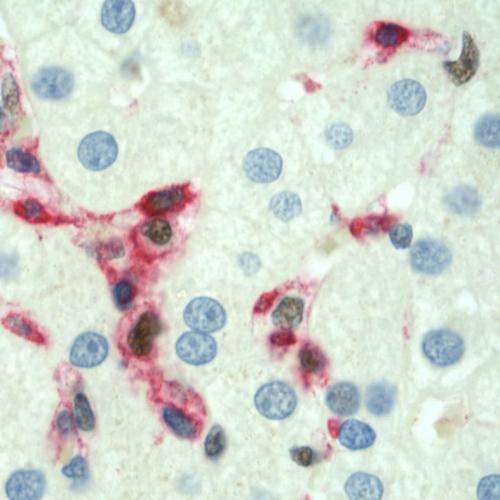This is an inflamed liver containing immune cells expressing AP-1 protein (brown). Credit: CNIO
Viral infections are the primary cause of liver inflammation or hepatitis, affecting hundreds of millions of people all over the world, and they represent a public health problem worldwide. The acute condition can cause irreversible damage to the liver, and if not cured can become chronic, leading to serious diseases such as cirrhosis or cancer.
A study published today in the online edition of The Journal of Clinical Investigation, and carried out by Erwin Wagner's team, Director of the BBVA Foundation-CNIO Cancer Cell Biology Programme and holder of an ERC Advanced Grant, shows how the immune system 'attacks' liver cells during hepatitis by using the AP-1 gene JunB.
Latifa Bakiri, one of the study's authors and a researcher in Wagner's laboratory details: "The activation of the JunB/AP-1 gene in a subset of immune cells, called NK cells, increases the production of interferon-gamma that attacks liver cells while the organ is suffering from hepatitis".
With this discovery, the study's authors propose a new mechanism by which AP-1 acts as a double-edged sword in the liver: it's a first line of defence against viruses that cause the disease, but also encourages liver damage depending on the diet or genetics of the patient.
"The balance of these signals is fundamental to the understanding of the pathogenesis of inflammatory liver disease and to design new therapeutic approaches to reverse this disease", says Wagner.
NK-type immune cells are also part of the micro-environment surrounding tumours. Researchers point out in the discussion of the article that a better knowledge of these cells may be vital for designing immune-therapies that specifically target tumour cells.
More information: JUNB/AP-1 controls IFN-γ during inflammatory liver disease. Martin K. Thomsen, Latifa Bakiri, Sebastian C. Hasenfuss, Rainer Hamacher, Lola Martinez, Erwin F. Wagner. The Journal of Clinical Investigation (2013). DOI: 10.1172/JCI70405
Journal information: Journal of Clinical Investigation
Provided by Centro Nacional de Investigaciones Oncologicas (CNIO)



















